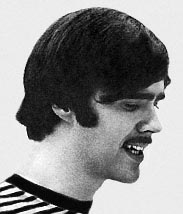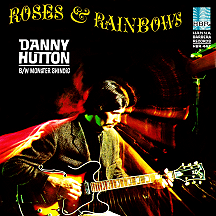DANNY HUTTON
Roses and Rainbows
On his way to inevitable fame and fortune, Danny Hutton made some colorful contributions to the music world, having fun every step of the way. Born out in the country, in the small town of Buncrana, Ireland, he moved with his family to Boston in 1947 when he was four years old. A return visit to Ireland in the late '50s sparked his interest in music; after buying an inexpensive guitar in Belfast, he brought it back with him and spent the next few years playing and writing songs. By this time he was living in Los Angeles and an encouraging audition with A&M records in 1964 resulted in a single on the Almo label, "Why Don't You Love Me Anymore," as Daring Dan Hutton.
Fortunately, he avoided being forever known as "Daring Dan" when the record failed to hit. He had made a few connections in L.A., doing studio session work while scheming to get himself another record release. A friendship with Brian Wilson developed and that led to a wayward remake of The Beach Boys' "Farmer's Daughter" during an improvised goof-off session. The song, featuring a falsetto vocal by Wilson with Hutton's backing vocals, was released by Mercury Records under the pseudonym Basil Swift and the Seegrams in early 1965. B side "Shambles" was an instrumental harmonica tune quickly thrown together on the same night.
A promising opportunity came along in 1965 when the Hanna-Barbera company went beyond its successful Yogi Bear-Flintstones-Jetsons television animation domination and started Hanna-Barbera Records, partly for the purpose of putting out records featuring their cartoon characters (rather than licensing the rights to other record labels) and also, as a sideline, to get their hands a little dirty on the rock music scene. Danny had been working on the loading dock at Disney's Buena Vista Records (his legitimate day job) and was a regular at a few of the Hollywood hangouts (International House of Pancakes, restaurant of the stars!) when he met producer Kim Fowley, who hooked him up with Larry Goldberg of HBR. He was hired by the label and they put him to work doing minor music, sound effects and voices for some of their cartoons. Before long he had recorded "Nothing At All," a folk rock-style single backed with "Big Bright Eyes," released under the name The Bats, with writer credit going to the group which was, in reality, a one man band...Hutton wrote the songs, did all the singing and played all the instruments.
HBR executives were impressed with the versatility Daring Dan was showing in the studio and assigned him the task of recording songs (written by others) for an album called Monster Shindig, scheduled for release in time for Halloween. The album featured Hanna-Barbera characters Super Snooper and Blabber Mouse, the Gruesomes (a monster family featured on The Flintstones a year earlier) and cartoon versions of Dracula, Frankenstein, the Mummy and the Wolf Man; the title track, "Monster Shindig," showed up as the flip side of "Roses and Rainbows," the first HBR release to give artist credit to Danny Hutton; it was right there on the label in black and white.

Though Danny had written the song, Goldberg's name was attached to the writing credits; between that and the semi-juvenile B side (in his opinion just a quickie tune from a "kiddie album"), Danny was not particularly pleased (though to its credit, "Monster Shindig" is pretty catchy and would fit in nicely at your next Halloween party). The label made some amends for this compromise by working hard to get the song played on the radio; all three top 40 stations in L.A. began spinning it in August of '65, giving him at least temporary cause to celebrate. When the sixth season of The Flintstones began on ABC September 17 with the episode No Biz Like Show Biz, Hutton was briefly shown as a cartoon character, singing an alternate version of "Roses and Rainbows" as Fred and Barney flipped through the channels that were broadcasting to Bedrock TV sets some three million years ago. Danny's voice was triple-tracked on the recording, a subtle forecast of things to come. It hit the top ten in Southern California but didn't click in many cities outside the west coast, in spite of its having been seen by 30 million or more Flintstones followers. For many like myself who remember hearing the song during that late summer and fall, it remains one of the highlights of 1965.
For the follow-up, HBR had Danny remix the earlier Bats single, "Big Bright Eyes," to no avail. The label heads called the shots on which songs were used for B sides; "Monster Shindig Part 2" (an alternate, faux-live version of the original) was the dubious choice. Hutton, feeling bogged down by the cartoon connection and increasing lack of creative freedom, hired a new agent who freed him from the label and cut a deal with MGM Records. Hanna-Barbera didn't put up a fight; by that time they were caught up in the success of HBR's latest find, The Five Americans (off to a hot start with "I See the Light"). Meanwhile, Danny was one of the hundreds of hopefuls to audition for a spot on the forthcoming TV series The Monkees. You already know how that played out.
The first single for Danny's new label was "Funny How Love Can Be," written by John Carter and Ken Lewis of The Ivy League. That group's version had been a hit in England in early '65. He planned to cover the leisurely-paced song for the U.S. as an uptempo number, but with the help of arranger Gene Page it went beyond reason, becoming a manic blast of medieval-influenced energy quite unlike anything else in 1966. As before, the song was a big hit on Hutton's home turf but received limited airplay outside the area. No one could have known it at the time, but the recording's sound and texture was a sneak peek at the kinds of things Danny would be doing with Three Dog Night before decade's end.
After one more single, he was through at MGM. Danny met Cory Wells, lead singer of The Enemys, a garage rock band with four previous singles on the Valiant and MGM labels in '65 and '66. With Chuck Negron, they formed Redwood and laid down several tracks produced by Brian Wilson, including the Wilson-Mike Love song "Darlin'" (later a hit for the Beach Boys), but the recordings weren't released. Changing the name of the group, Hutton, Wells and Negron signed a contract with Dunhill Records and "Nobody" became Three Dog Night's debut single in the fall of 1968. In a pattern familiar to Danny Hutton, the single went top ten in Los Angeles in December but faltered nationally. No need for concern, though: "Try a Little Tenderness," an old fashioned love song dating back to 1932 (but arranged similar to the 1966 hit version by Otis Redding) landed them in the top 40 in early '69...breakthrough finally realized. "One," "Easy to Be Hard" (from the musical Hair) and "Eli's Coming," all top ten smashes, rounded out the year. Three Dog Night went on to spread a little joy to the world as one of the most popular and best-selling acts of the following decade.


